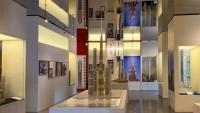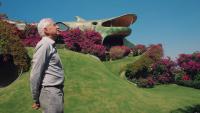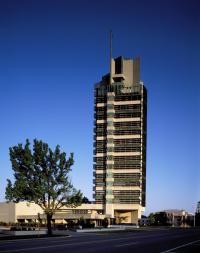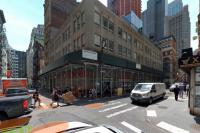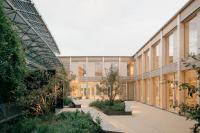Dalki Theme Park and Shop
Heyri, South Korea
Dalki is a cartoon character invented to market clothes and other products for children and teenagers. She is an imaginary girl who lives in a garden with her friends. Dalki Theme park is a building where these imaginary characters interact with human visitors in a real, physical setting. The space accommodates shopping, playing, eating and lounging as well as exhibits dealing with scale, nature and the Dalki characters.
Learned dichotomies (imaginary/ real, shopping / play, natural/ synthetic, site/ building, culture/ commerce) and different scales create a critical distance, “disbelief”, which potentially keeps users from fully engaging the realization of this imaginary world. Borrowing strategies for “suspension of disbelief” from literature, our project blurs these dichotomies and eases users into the “story” of Dalki with a fluid organization of space and program.
The building defines three zones vertically. The open ground level is a scaleless artificial garden. Different program areas spread throughout the raised interior space encourage mixing between programs and openness. A garden and lounge on the roof extend the natural landscape, referring to four lush surrounding hills. Rather than abstracting from nature, the building is a synthetic hyper-representation of nature (meta-real): mimicking while questioning the nature of nature. Merging these levels into each other and into the site creates a seamless transition between zones and between building and site.
Merging allows smooth transitions between zones, from interior to exterior, building to landscape and between programs. The vertical overlap allows another type of connection – the short circuit. Like hypertext in html, users can jump in a non-linear way from one space/program to another, bypassing the sequence. The combination of the smooth flowing spaces, mixed program distribution and short circuits allows users to choreograph their experience by choosing trajectories or spatial sequences.
- Commercial
- Culture
- Art + Installation + Exhibition
- Retail + Stores
- Museums + Galleries
- Cultural Centers
- arkkitehdit
- Slade Architecture
- Year
- 2000










